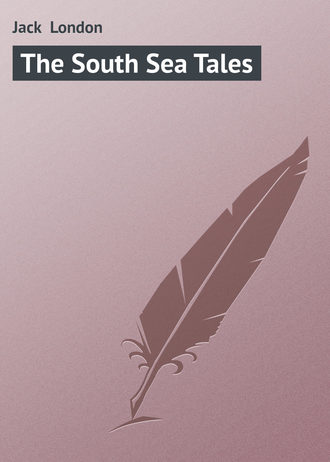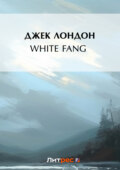
Джек Лондон
The South Sea Tales
"A little thing like a missionary does not matter," Erirola prompted.
"No, a little thing like a missionary does not matter," the Buli answered, himself again. "Mongondro shall have the boots. Go, you young men, some three or four of you, and meet the missionary on the trail. Be sure you bring back the boots as well."
"It is too late," said Erirola. "Listen! He comes now."
Breaking through the thicket of brush, John Starhurst, with Narau close on his heels, strode upon the scene. The famous boots, having filled in wading the stream, squirted fine jets of water at every step. Starhurst looked about him with flashing eyes. Upborne by an unwavering trust, untouched by doubt or fear, he exulted in all he saw. He knew that since the beginning of time he was the first white man ever to tread the mountain stronghold of Gatoka.
The grass houses clung to the steep mountain side or overhung the rushing Rewa. On either side towered a mighty precipice. At the best, three hours of sunlight penetrated that narrow gorge. No cocoanuts nor bananas were to be seen, though dense, tropic vegetation overran everything, dripping in airy festoons from the sheer lips of the precipices and running riot in all the crannied ledges. At the far end of the gorge the Rewa leaped eight hundred feet in a single span, while the atmosphere of the rock fortress pulsed to the rhythmic thunder of the fall.
From the Buli's house, John Starhurst saw emerging the Buli and his followers.
"I bring you good tidings," was the missionary's greeting.
"Who has sent you?" the Buli rejoined quietly.
"God."
"It is a new name in Viti Levu," the Buli grinned. "Of what islands, villages, or passes may he be chief?"
"He is the chief over all islands, all villages, all passes," John Starhurst answered solemnly. "He is the Lord over heaven and earth, and I am come to bring His word to you."
"Has he sent whale teeth?" was the insolent query.
"No, but more precious than whale teeth is the—"
"It is the custom, between chiefs, to send whale teeth," the Buli interrupted.
"Your chief is either a niggard, or you are a fool, to come empty-handed into the mountains. Behold, a more generous than you is before you."
So saying, he showed the whale tooth he had received from Erirola.
Narau groaned.
"It is the whale tooth of Ra Vatu," he whispered to Starhurst. "I know it well. Now are we undone."
"A gracious thing," the missionary answered, passing his hand through his long beard and adjusting his glasses. "Ra Vatu has arranged that we should be well received."
But Narau groaned again, and backed away from the heels he had dogged so faithfully.
"Ra Vatu is soon to become Lotu," Starhurst explained, "and I have come bringing the Lotu to you."
"I want none of your Lotu," said the Buli, proudly. "And it is in my mind that you will be clubbed this day."
The Buli nodded to one of his big mountaineers, who stepped forward, swinging a club. Narau bolted into the nearest house, seeking to hide among the woman and mats; but John Starhurst sprang in under the club and threw his arms around his executioner's neck. From this point of vantage he proceeded to argue. He was arguing for his life, and he knew it; but he was neither excited nor afraid.
"It would be an evil thing for you to kill me," he told the man. "I have done you no wrong, nor have I done the Buli wrong."
So well did he cling to the neck of the one man that they dared not strike with their clubs. And he continued to cling and to dispute for his life with those who clamored for his death.
"I am John Starhurst," he went on calmly. "I have labored in Fiji for three years, and I have done it for no profit. I am here among you for good. Why should any man kill me? To kill me will not profit any man."
The Buli stole a look at the whale tooth. He was well paid for the deed.
The missionary was surrounded by a mass of naked savages, all struggling to get at him. The death song, which is the song of the oven, was raised, and his expostulations could no longer be heard. But so cunningly did he twine and wreathe his body about his captor's that the death blow could not be struck. Erirola smiled, and the Buli grew angry.
"Away with you!" he cried. "A nice story to go back to the coast—a dozen of you and one missionary, without weapons, weak as a woman, overcoming all of you."
"Wait, O Buli," John Starhurst called out from the thick of the scuffle, "and I will overcome even you. For my weapons are Truth and Right, and no man can withstand them."
"Come to me, then," the Buli answered, "for my weapon is only a poor miserable club, and, as you say, it cannot withstand you."
The group separated from him, and John Starhurst stood alone, facing the Buli, who was leaning on an enormous, knotted warclub.
"Come to me, missionary man, and overcome me," the Buli challenged.
"Even so will I come to you and overcome you," John Starhurst made answer, first wiping his spectacles and settling them properly, then beginning his advance.
The Buli raised the club and waited.
"In the first place, my death will profit you nothing," began the argument.
"I leave the answer to my club," was the Buli's reply.
And to every point he made the same reply, at the same time watching the missionary closely in order to forestall that cunning run-in under the lifted club. Then, and for the first time, John Starhurst knew that his death was at hand. He made no attempt to run in. Bareheaded, he stood in the sun and prayed aloud—the mysterious figure of the inevitable white man, who, with Bible, bullet, or rum bottle, has confronted the amazed savage in his every stronghold. Even so stood John Starhurst in the rock fortress of the Buli of Gatoka.
"Forgive them, for they know not what they do," he prayed. "O Lord! Have mercy upon Fiji. Have compasssion for Fiji. O Jehovah, hear us for His sake, Thy Son, whom Thou didst give that through Him all men might also become Thy children. From Thee we came, and our mind is that to Thee we may return. The land is dark, O Lord, the land is dark. But Thou art mighty to save. Reach out Thy hand, O Lord, and save Fiji, poor cannibal Fiji."
The Buli grew impatient.
"Now will I answer thee," he muttered, at the same time swinging his club with both hands.
Narau, hiding among the women and the mats, heard the impact of the blow and shuddered. Then the death song arose, and he knew his beloved missionary's body was being dragged to the oven as he heard the words:
"Drag me gently. Drag me gently."
"For I am the champion of my land."
"Give thanks! Give thanks! Give thanks!"
Next, a single voice arose out of the din, asking:
"Where is the brave man?"
A hundred voices bellowed the answer:
"Gone to be dragged into the oven and cooked."
"Where is the coward?" the single voice demanded.
"Gone to report!" the hundred voices bellowed back. "Gone to report! Gone to report!"
Narau groaned in anguish of spirit. The words of the old song were true. He was the coward, and nothing remained to him but to go and report.
Mauki
He weighed one hundred and ten pounds. His hair was kinky and negroid, and he was black. He was peculiarly black. He was neither blue-black nor purple-black, but plum-black. His name was Mauki, and he was the son of a chief. He had three tambos. Tambo is Melanesian for taboo, and is first cousin to that Polynesian word. Mauki's three tambos were as follows: First, he must never shake hands with a woman, nor have a woman's hand touch him or any of his personal belongings; secondly, he must never eat clams nor any food from a fire in which clams had been cooked; thirdly, he must never touch a crocodile, nor travel in a canoe that carried any part of a crocodile even if as large as a tooth.
Of a different black were his teeeth, which were deep black, or, perhaps better, LAMP-black. They had been made so in a single night, by his mother, who had compressed about them a powdered mineral which was dug from the landslide back of Port Adams. Port Adams is a salt-water village on Malaita, and Malaita is the most savage island in the Solomons—so savage that no traders or planters have yet gained a foothold on it; while, from the time of the earliest bêche-de-mer fishers and sandalwood traders down to the latest labor recruiters equipped with automatic rifles and gasolene engines, scores of white adventurers have been passed out by tomahawks and soft-nosed Snider bullets. So Malaita remains today, in the twentieth century, the stamping ground of the labor recruiters, who farm its coasts for laborers who engage and contract themselves to toil on the plantations of the neighboring and more civilized islands for a wage of thirty dollars a year. The natives of those neighboring and more civilized islands have themselves become too civilized to work on plantations.
Mauki's ears were pierced, not in one place, nor two places, but in a couple of dozen places. In one of the smaller holes he carried a clay pipe. The larger holes were too large for such use. The bowl of the pipe would have fallen through. In fact, in the largest hole in each ear he habitually wore round wooden plugs that were an even four inches in diameter. Roughly speaking, the circumference of said holes was twelve and one-half inches. Mauki was catholic in his tastes. In the various smaller holes he carried such things as empty rifle cartridges, horseshoe nails, copper screws, pieces of string, braids of sennit, strips of green leaf, and, in the cool of the day, scarlet hibiscus flowers. From which it will be seen that pockets were not necessary to his well-being. Besides, pockets were impossible, for his only wearing apparel consisted of a piece of calico several inches wide. A pocket knife he wore in his hair, the blade snapped down on a kinky lock. His most prized possession was the handle of a china cup, which he suspended from a ring of turtle-shell, which, in turn, was passed through the partition-cartilage of his nose.
But in spite of embellishments, Mauki had a nice face. It was really a pretty face, viewed by any standard, and for a Melanesian it was a remarkably good-looking face. Its one fault was its lack of strength. It was softly effeminate, almost girlish. The features were small, regular, and delicate. The chin was weak, and the mouth was weak. There was no strength nor character in the jaws, forehead, and nose. In the eyes only could be caught any hint of the unknown quantities that were so large a part of his make-up and that other persons could not understand. These unknown quantities were pluck, pertinacity, fearlessness, imagination, and cunning; and when they found expression in some consistent and striking action, those about him were astounded.
Mauki's father was chief over the village at Port Adams, and thus, by birth a salt-water man, Mauki was half amphibian. He knew the way of the fishes and oysters, and the reef was an open book to him. Canoes, also, he knew. He learned to swim when he was a year old. At seven years he could hold his breath a full minute and swim straight down to bottom through thirty feet of water. And at seven years he was stolen by the bushmen, who cannot even swim and who are afraid of salt water. Thereafter Mauki saw the sea only from a distance, through rifts in the jungle and from open spaces on the high mountain sides. He became the slave of old Fanfoa, head chief over a score of scattered bush-villages on the range-lips of Malaita, the smoke of which, on calm mornings, is about the only evidence the seafaring white men have of the teeming interior population. For the whites do not penetrate Malaita. They tried it once, in the days when the search was on for gold, but they always left their heads behind to grin from the smoky rafters of the bushmen's huts.
When Mauki was a young man of seventeen, Fanfoa got out of tobacco. He got dreadfully out of tobacco. It was hard times in all his villages. He had been guilty of a mistake. Suo was a harbor so small that a large schooner could not swing at anchor in it. It was surrounded by mangroves that overhung the deep water. It was a trap, and into the trap sailed two white men in a small ketch. They were after recruits, and they possessed much tobacco and trade goods, to say nothing of three rifles and plenty of ammunition. Now there were no salt-water men living at Suo, and it was there that the bushmen could come down to the sea. The ketch did a splendid traffic. It signed on twenty recruits the first day. Even old Fanfoa signed on. And that same day the score of new recruits chopped off the two white men's head, killed the boat's crew, and burned the ketch. Thereafter, and for three months, there was tobacco and trade goods in plenty and to spare in all the bush villages. Then came the man-of-war that threw shells for miles into the hills, frightening the people out of their villages and into the deeper bush. Next the man-of-war sent landing parties ashore. The villages were all burned, along with the tobacco and trade stuff.
The cocoanuts and bananas were chopped down, the taro gardens uprooted, and the pigs and chickens killed.
It taught Fanfoa a lesson, but in the meantime he was out of tobacco. Also, his young men were too frightened to sign on with the recruiting vessels. That was why Fanfoa ordered his slave, Mauki, to be carried down and signed on for half a case of tobacco advance, along with knives, axes, calico, and beads, which he would pay for with his toil on the plantations. Mauki was sorely frightened when they brought him on board the schooner. He was a lamb led to the slaughter. White men were ferocious creatures. They had to be, or else they would not make a practice of venturing along the Malaita coast and into all harbors, two on a schooner, when each schooner carried from fifteen to twenty blacks as boat's crew, and often as high as sixty or seventy black recruits. In addition to this, there was always the danger of the shore population, the sudden attack and the cutting off of the schooner and all hands. Truly, white men must be terrible. Besides, they were possessed of such devil-devils—rifles that shot very rapidly many times, things of iron and brass that made the schooners go when there was no wind, and boxes that talked and laughed just as men talked and laughed.
Ay, and he had heard of one white man whose particular devil-devil was so powerful that he could take out all his teeth and put them back at will.
Down into the cabin they took Mauki. On deck, the one white man kept guard with two revolvers in his belt. In the cabin the other white man sat with a book before him, in which he inscribed strange marks and lines. He looked at Mauki as though he had been a pig or a fowl, glanced under the hollows of his arms, and wrote in the book. Then he held out the writing stick and Mauki just barely touched it with his hand, in so doing pledging himself to toil for three years on the plantations of the Moongleam Soap Company. It was not explained to him that the will of the ferocious white men would be used to enforce the pledge, and that, behind all, for the same use, was all the power and all the warships of Great Britain.
Other blacks there were on board, from unheard-of far places, and when the white man spoke to them, they tore the long feather from Mauki's hair, cut that same hair short, and wrapped about his waist a lava-lava of bright yellow calico.
After many days on the schooner, and after beholding more land and islands than he had ever dreamed of, he was landed on New Georgia, and put to work in the field clearing jungle and cutting cane grass. For the first time he knew what work was. Even as a slave to Fanfoa he had not worked like this. And he did not like work. It was up at dawn and in at dark, on two meals a day. And the food was tiresome. For weeks at a time they were given nothing but sweet potatoes to eat, and for weeks at a time it would be nothing but rice. He cut out the cocoanut from the shells day after day; and for long days and weeks he fed the fires that smoked the copra, till his eyes got sore and he was set to felling trees. He was a good axe-man, and later he was put in the bridge-building gang. Once, he was punished by being put in the road-building gang. At times he served as boat's crew in the whale boats, when they brought in copra from distant beaches or when the white men went out to dynamite fish.
Among other things he learned beche-de-mer English, with which he could talk with all white men, and with all recruits who otherwise would have talked in a thousand different dialects. Also, he learned certain things about the white men, principally that they kept their word. If they told a boy he was going to receive a stick of tobacco, he got it. If they told a boy they would knock seven bells out of him if he did a certain thing, when he did that thing, seven bells invariably were knocked out of him. Mauki did not know what seven bells were, but they occurred in beche-de-mer, and he imagined them to be the blood and teeth that sometimes accompanied the process of knocking out seven bells. One other thing he learned: no boy was struck or punished unless he did wrong. Even when the white men were drunk, as they were frequently, they never struck unless a rule had been broken.
Mauki did not like the plantation. He hated work, and he was the son of a chief. Furthermore, it was ten years since he had been stolen from Port Adams by Fanfoa, and he was homesick. He was even homesick for the slavery under Fanfoa. So he ran away. He struck back into the bush, with the idea of working southward to the beach and stealing a canoe in which to go home to Port Adams.
But the fever got him, and he was captured and brought back more dead than alive.
A second time he ran away, in the company of two Malaita boys. They got down the coast twenty miles, and were hidden in the hut of a Malaita freeman, who dwelt in that village. But in the dead of night two white men came, who were not afraid of all the village people and who knocked seven bells out of the three runaways, tied them like pigs, and tossed them into the whale boat. But the man in whose house they had hidden—seven times seven bells must have been knocked out of him from the way the hair, skin, and teeth flew, and he was discouraged for the rest of his natural life from harboring runaway laborers.
For a year Mauki toiled on. Then he was made a house-boy, and had good food and easy times, with light work in keeping the house clean and serving the white men with whiskey and beer at all hours of the day and most hours of the night. He liked it, but he liked Port Adams more. He had two years longer to serve, but two years were too long for him in the throes of homesickness. He had grown wiser with his year of service, and, being now a house-boy, he had opportunity. He had the cleaning of the rifles, and he knew where the key to the store room was hung. He planned to escape, and one night ten Malaita boys and one boy from San Cristoval sneaked from the barracks and dragged one of the whale boats down to the beach. It was Mauki who supplied the key that opened the padlock on the boat, and it was Mauki who equipped the boat with a dozen Winchesters, an immense amount of ammunition, a case of dynamite with detonators and fuse, and ten cases of tobacco.
The northwest monsoon was blowing, and they fled south in the night time, hiding by day on detached and uninhabited islets, or dragging their whale boat into the bush on the large islands. Thus they gained Guadalcanar, skirted halfway along it, and crossed the Indispensable Straits to Florida Island. It was here that they killed the San Cristoval boy, saving his head and cooking and eating the rest of him. The Malaita coast was only twenty miles away, but the last night a strong current and baffling winds prevented them from gaining across. Daylight found them still several miles from their goal. But daylight brought a cutter, in which were two white men, who were not afraid of eleven Malaita men armed with twelve rifles. Mauki and his companions were carried back to Tulagi, where lived the great white master of all the white men. And the great white master held a court, after which, one by one, the runaways were tied up and given twenty lashes each, and sentenced to a fine of fifteen dollars. They were sent back to New Georgia, where the white men knocked seven bells out of them all around and put them to work. But Mauki was no longer house-boy. He was put in the road-making gang. The fine of fifteen dollars had been paid by the white men from whom he had run away, and he was told that he would have to work it out, which meant six months' additional toil. Further, his share of the stolen tobacco earned him another year of toil.
Port Adams was now three years and a half away, so he stole a canoe one night, hid on the islets in Manning Straits, passed through the Straits, and began working along the eastern coast of Ysabel, only to be captured, two-thirds of the way along, by the white men on Meringe Lagoon. After a week, he escaped from them and took to the bush. There were no bush natives on Ysabel, only salt-water men, who were all Christians. The white men put up a reward of five-hundred sticks of tobacco, and every time Mauki ventured down to the sea to steal a canoe he was chased by the salt-water men. Four months of this passed, when, the reward having been raised to a thousand sticks, he was caught and sent back to New Georgia and the road-building gang. Now a thousand sticks are worth fifty dollars, and Mauki had to pay the reward himself, which required a year and eight months' labor. So Port Adams was now five years away.
His homesickness was greater than ever, and it did not appeal to him to settle down and be good, work out his four years, and go home. The next time, he was caught in the very act of running away. His case was brought before Mr. Haveby, the island manager of the Moongleam Soap Company, who adjudged him an incorrigible. The Company had plantations on the Santa Cruz Islands, hundreds of miles across the sea, and there it sent its Solomon Islands' incorrigibles. And there Mauki was sent, though he never arrived. The schooner stopped at Santa Anna, and in the night Mauki swam ashore, where he stole two rifles and a case of tobacco from the trader and got away in a canoe to Cristoval. Malaita was now to the north, fifty or sixty miles away. But when he attempted the passage, he was caught by a light gale and driven back to Santa Anna, where the trader clapped him in irons and held him against the return of the schooner from Santa Cruz. The two rifles the trader recovered, but the case of tobacco was charged up to Mauki at the rate of another year. The sum of years he now owed the Company was six.
On the way back to New Georgia, the schooner dropped anchor in Marau Sound, which lies at the southeastern extremity of Guadalcanar. Mauki swam ashore with handcuffs on his wrists and got away to the bush. The schooner went on, but the Moongleam trader ashore offered a thousand sticks, and to him Mauki was brought by the bushmen with a year and eight months tacked on to his account. Again, and before the schooner called in, he got away, this time in a whale boat accompanied by a case of the trader's tobacco. But a northwest gale wrecked him upon Ugi, where the Christian natives stole his tobacco and turned him over to the Moongleam trader who resided there. The tobacco the natives stole meant another year for him, and the tale was now eight years and a half.
"We'll send him to Lord Howe," said Mr. Haveby. "Bunster is there, and we'll let them settle it between them. It will be a case, I imagine, of Mauki getting Bunster, or Bunster getting Mauki, and good riddance in either event."
If one leaves Meringe Lagoon, on Ysabel, and steers a course due north, magnetic, at the end of one hundred and fifty miles he will lift the pounded coral beaches of Lord Howe above the sea. Lord Howe is a ring of land some one hundred and fifty miles in circumference, several hundred yards wide at its widest, and towering in places to a height of ten feet above sea level. Inside this ring of sand is a mighty lagoon studded with coral patches. Lord Howe belongs to the Solomons neither geographically nor ethnologically. It is an atoll, while the Solomons are high islands; and its people and language are Polynesian, while the inhabitants of the Solomons are Melanesian.
Lord Howe has been populated by the westward Polynesian drift which continues to this day, big outrigger canoes being washed upon its beaches by the southeast trade. That there has been a slight Melanesian drift in the period of the northwest monsoon, is also evident.
Nobody ever comes to Lord Howe, or Ontong-Java as it is sometimes called. Thomas Cook & Son do not sell tickets to it, and tourists do not dream of its existence. Not even a white missionary has landed on its shore. Its five thousand natives are as peaceable as they are primitive. Yet they were not always peaceable. The Sailing Directions speak of them as hostile and treacherous. But the men who compile the Sailing Directions have never heard of the change that was worked in the hearts of the inhabitants, who, not many years ago, cut off a big bark and killed all hands with the exception of the second mate. The survivor carried the news to his brothers. The captains of three trading schooners returned with him to Lord Howe. They sailed their vessels right into the lagoon and proceeded to preach the white man's gospel that only white men shall kill white men and that the lesser breeds must keep hands off. The schooners sailed up and down the lagoon, harrying and destroying. There was no escape from the narrow sand-circle, no bush to which to flee. The men were shot down at sight, and there was no avoiding being sighted. The villages were burned, the canoes smashed, the chickens and pigs killed, and the precious cocoanut trees chopped down. For a month this continued, when the schooner sailed away; but the fear of the white man had been seared into the souls of the islanders and never again were they rash enough to harm one.
Max Bunster was the one white man on Lord Howe, trading in the pay of the ubiquitous Moongleam Soap Company. And the Company billeted him on Lord Howe, because, next to getting rid of him, it was the most out-of-the-way place to be found. That the Company did not get rid of him was due to the difficulty of finding another man to take his place. He was a strapping big German, with something wrong in his brain. Semi-madness would be a charitable statement of his condition. He was a bully and a coward, and a thrice-bigger savage than any savage on the island.
Being a coward, his brutality was of the cowardly order. When he first went into the Company's employ, he was stationed on Savo. When a consumptive colonial was sent to take his place, he beat him up with his fists and sent him off a wreck in the schooner that brought him.
Mr. Haveby next selected a young Yorkshire giant to relieve Bunster. The Yorkshire man had a reputation as a bruiser and preferred fighting to eating. But Bunster wouldn't fight. He was a regular little lamb—for ten days, at the end of which time the Yorkshire man was prostrated by a combined attack of dysentery and fever. Then Bunster went for him, among other things getting him down and jumping on him a score or so of times. Afraid of what would happen when his victim recovered. Bunster fled away in a cutter to Guvutu, where he signalized himself by beating up a young Englishman already crippled by a Boer bullet through both hips.
Then it was that Mr. Haveby sent Bunster to Lord Howe, the falling-off place. He celebrated his landing by mopping up half a case of gin and by thrashing the elderly and wheezy mate of the schooner which had brought him. When the schooner departed, he called the kanakas down to the beach and challenged them to throw him in a wrestling bout, promising a case of tobacco to the one who succeeded. Three kanakas he threw, but was promptly thrown by a fourth, who, instead of receiving the tobacco, got a bullet through his lungs.
And so began Bunster's reign on Lord Howe. Three thousand people lived in the principal village; but it was deserted, even in broad day, when he passed through. Men, women, and children fled before him. Even the dogs and pigs got out of the way, while the king was not above hiding under a mat. The two prime ministers lived in terror of Bunster, who never discussed any moot subject, but struck out with his fists instead.
And to Lord Howe came Mauki, to toil for Bunster for eight long years and a half. There was no escaping from Lord Howe. For better or worse, Bunster and he were tied together. Bunster weighed two hundred pounds. Mauki weighed one hundred and ten. Bunster was a degenerate brute. But Mauki was a primitive savage. While both had wills and ways of their own.
Mauki had no idea of the sort of master he was to work for. He had had no warnings, and he had concluded as a matter of course that Bunster would be like other white men, a drinker of much whiskey, a ruler and a lawgiver who always kept his word and who never struck a boy undeserved. Bunster had the advantage. He knew all about Mauki, and gloated over the coming into possession of him. The last cook was suffering from a broken arm and a dislocated shoulder, so Bunster made Mauki cook and general house-boy.
And Mauki soon learned that there were white men and white men. On the very day the schooner departed he was ordered to buy a chicken from Samisee, the native Tongan missionary. But Samisee had sailed across the lagoon and would not be back for three days. Mauki returned with the information. He climbed the steep stairway (the house stood on piles twelve feet above the sand), and entered the living room to report. The trader demanded the chicken. Mauki opened his mouth to explain the missionary's absence. But Bunster did not care for explanations. He struck out with his fist. The blow caught Mauki on the mouth and lifted him into the air. Clear through the doorway he flew, across the narrow veranda, breaking the top railing, and down to the ground.







